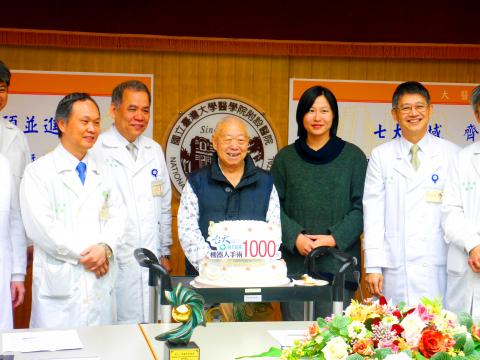National Taiwan University Hospital (NTUH) yesterday celebrated its 1,000th operation using the da Vinci robotic surgical system, which was introduced to the hospital in late 2011.
Department of Surgery director Lai Hong-shiee (賴鴻緒) said the 1,000th da Vinci surgery was carried out on Nov. 24 on an 81-year-old man, surnamed Wang (王), who was diagnosed with colorectal cancer six months ago after experiencing bloody and narrow stools.
“On the same day, we also used the robotic system to help remove a rectal tumor located just 6cm away from the anal verge of a 37-year-old woman, surnamed Chia (賈). She is a computer engineer who has a stressful job, often dines out and seldom consumes vegetables,” Lai told a press conference in Taipei.

Photo: Lin Hui-chin, Taipei Times
Lai said that while the hospital was only the ninth one to purchase the sophisticated robotic platform, it has achieved three milestones in its application: It was the first medical institution in Taiwan to perform 1,000 da Vinci surgeries; it has carried out the most diverse types of operations using the system; and its da Vinci surgeries have the highest difficulty level on average when compared with those performed by other hospitals in the country.
The 1,000 operations covered: 229 general surgeries; 130 thoracic surgeries; 97 colorectal surgeries; 98 cardiac and vascular surgeries; 110 ear, nose and throat surgeries; 263 urological surgeries; and 73 gynecological surgeries, Lai said, adding that the hospital plans to purchase its second da Vinci system early next year.
As of August this year, a total of 22 medical facilities nationwide boasted a da Vinci surgical system, with the Tri-Service General Hospital being the first to acquire the machine in September 2004.
Singling out the most noteworthy case, Yang Tsung-lin (楊宗霖), an attending physician at NTUH’s Department of Otolaryngology and Head Neck Surgery, said that in 2012, he used da Vinci to remove a salivary gland tumor from a 30-year-old woman’s neck through a 5cm incision along the hairline behind her right ear.
“Unlike traditional surgery, which can only gain access to such a tumor through a direct opening on the neck, leaving behind a long visible scar shaped like a necklace, my surgical approach managed not only to take out the tumor, but also allowed the patient to maintain her pre-surgical appearance without any obvious scars,” Yang said.
Yang said the scar-free method, which was published in the British Journal of Oral and Maxillofacial Surgery in May, can be applied to the removal of almost all kinds of head and neck tumors, and has been performed on more than 100 patients at the hospital over the past two years.
However, as the difficulty of a surgery is inversely proportional to the size of the incision, the method can only be performed by well-trained doctors with abundant experience in operating the da Vinci system, Yang added.
Department of Surgery vice director Liang Jin-tung (梁金銅), who carried out the hospital’s 1,000th and 1,001st da Vinci operations, said that since the system is devoid of hand tremors, it is particularly ideal for the removal of colorectal tumors in patients who are obese or have a narrow pelvic cavity.
“Of course, the system also has its disadvantages, such as being large and heavy, and it does not give the operator a sense of touch,” Liang said.

Left-Handed Girl (左撇子女孩), a film by Taiwanese director Tsou Shih-ching (鄒時擎) and cowritten by Oscar-winning director Sean Baker, won the Gan Foundation Award for Distribution at the Cannes Critics’ Week on Wednesday. The award, which includes a 20,000 euro (US$22,656) prize, is intended to support the French release of a first or second feature film by a new director. According to Critics’ Week, the prize would go to the film’s French distributor, Le Pacte. "A melodrama full of twists and turns, Left-Handed Girl retraces the daily life of a single mother and her two daughters in Taipei, combining the irresistible charm of

A Philippine official has denied allegations of mistreatment of crew members during Philippine authorities’ boarding of a Taiwanese fishing vessel on Monday. Philippine Bureau of Fisheries and Aquatic Resources (BFAR) spokesman Nazario Briguera on Friday said that BFAR law enforcement officers “observed the proper boarding protocols” when they boarded the Taiwanese vessel Sheng Yu Feng (昇漁豐號) and towed it to Basco Port in the Philippines. Briguera’s comments came a day after the Taiwanese captain of the Sheng Yu Feng, Chen Tsung-tun (陳宗頓), held a news conference in Pingtung County and accused the Philippine authorities of mistreatment during the boarding of

88.2 PERCENT INCREASE: The variants driving the current outbreak are not causing more severe symptoms, but are ‘more contagious’ than previous variants, an expert said Number of COVID-19 cases in the nation is surging, with the Centers for Disease Control (CDC) describing the ongoing wave of infections as “rapid and intense,” and projecting that the outbreak would continue through the end of July. A total of 19,097 outpatient and emergency visits related to COVID-19 were reported from May 11 to Saturday last week, an 88.2 percent increase from the previous week’s 10,149 visits, CDC data showed. The nearly 90 percent surge in case numbers also marks the sixth consecutive weekly increase, although the total remains below the 23,778 recorded during the same period last year,

The Chinese Communist Party (CCP) is pushing for residents of Kinmen and Lienchiang counties to acquire Chinese ID cards in a bid to “blur national identities,” a source said. The efforts are part of China’s promotion of a “Kinmen-Xiamen twin-city living sphere, including a cross-strait integration pilot zone in China’s Fujian Province,” the source said. “The CCP is already treating residents of these outlying islands as Chinese citizens. It has also intensified its ‘united front’ efforts and infiltration of those islands,” the source said. “There is increasing evidence of espionage in Kinmen, particularly of Taiwanese military personnel being recruited by the